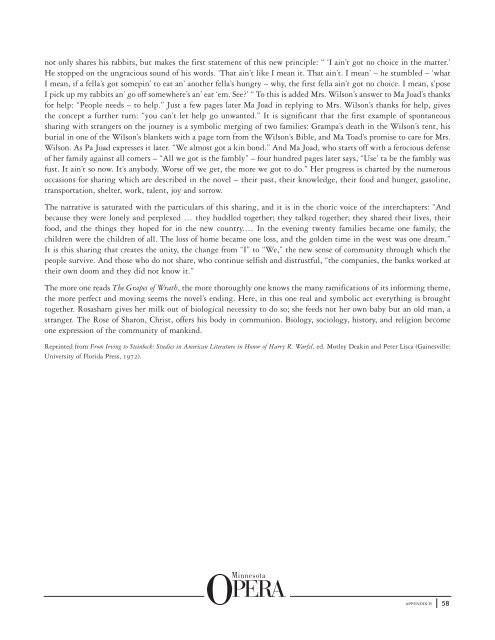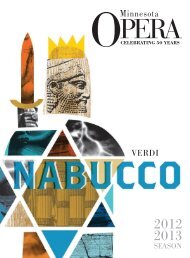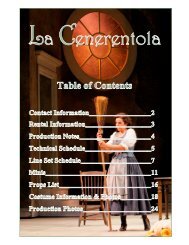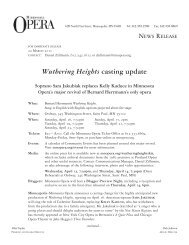You also want an ePaper? Increase the reach of your titles
YUMPU automatically turns print PDFs into web optimized ePapers that Google loves.
not only shares his rabbits, but makes the first statement of this new principle: “ ‘I ain’t got no choice in the matter.’<br />
He stopped on the ungracious sound of his words. ‘That ain’t like I mean it. That ain’t. I mean’ – he stumbled – ‘what<br />
I mean, if a fella’s got somepin’ to eat an’ another fella’s hungry – why, the first fella ain’t got no choice. I mean, s’pose<br />
I pick up my rabbits an’ go off somewhere’s an’ eat ‘em. See?’ “ To this is added Mrs. Wilson’s answer to Ma Joad’s thanks<br />
for help: “People needs – to help.” Just a few pages later Ma Joad in replying to Mrs. Wilson’s thanks for help, gives<br />
the concept a further turn: “you can’t let help go unwanted.” It is significant that the first example of spontaneous<br />
sharing with strangers on the journey is a symbolic merging of two families: Grampa’s death in the Wilson’s tent, his<br />
burial in one of the Wilson’s blankets with a page torn from the Wilson’s Bible, and Ma Toad’s promise to care for Mrs.<br />
Wilson. As Pa Joad expresses it later. “We almost got a kin bond.” And Ma Joad, who starts off with a ferocious defense<br />
of her family against all comers – “All we got is the fambly” – four hundred pages later says, “Use’ ta be the fambly was<br />
fust. It ain’t so now. It’s anybody. Worse off we get, the more we got to do.” Her progress is charted by the numerous<br />
occasions for sharing which are described in the novel – their past, their knowledge, their food and hunger, gasoline,<br />
transportation, shelter, work, talent, joy and sorrow.<br />
The narrative is saturated with the particulars of this sharing, and it is in the choric voice of the interchapters: “And<br />
because they were lonely and perplexed … they huddled together; they talked together; they shared their lives, their<br />
food, and the things they hoped for in the new country.… In the evening twenty families became one family, the<br />
children were the children of all. The loss of home became one loss, and the golden time in the west was one dream.”<br />
It is this sharing that creates the unity, the change from “I” to “We,” the new sense of community through which the<br />
people survive. And those who do not share, who continue selfish and distrustful, “the companies, the banks worked at<br />
their own doom and they did not know it.”<br />
The more one reads The <strong>Grapes</strong> of Wrath, the more thoroughly one knows the many ramifications of its informing theme,<br />
the more perfect and moving seems the novel’s ending. Here, in this one real and symbolic act everything is brought<br />
together. Rosasharn gives her milk out of biological necessity to do so; she feeds not her own baby but an old man, a<br />
stranger. The Rose of Sharon, Christ, offers his body in communion. Biology, sociology, history, and religion become<br />
one expression of the community of mankind.<br />
Reprinted from From Irving to Steinbeck: Studies in American Literature in Honor of Harry R. Warfel, ed. Motley Deakin and Peter Lisca (Gainesville:<br />
University of Florida Press, 1972).<br />
appendix b<br />
58








